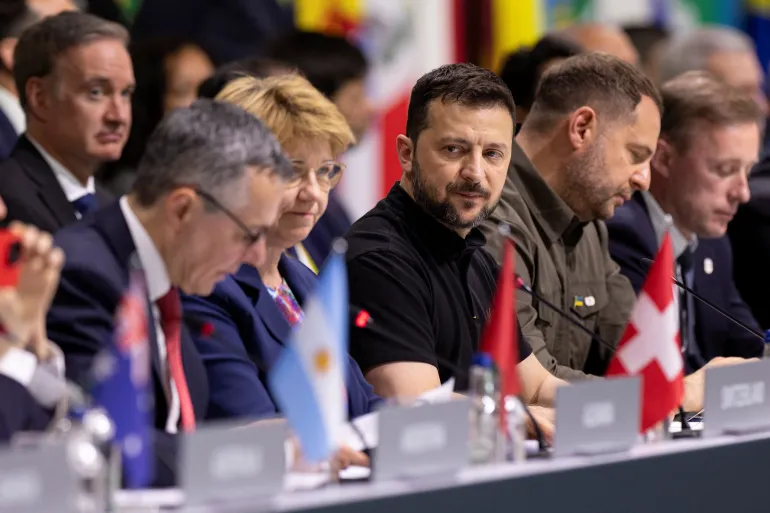
- If Kyiv’s motive was to build good relations with countries outside the West then Russia’s absence from the Ukraine Peace Summit was a major setback.
- Apart from discussions on issues of lesser priority, anti-Russian tirades and a so-called ‘peace declaration’ that was made purely on Western terms, there weren’t any meaningful discussions or negotiations at the summit.
- The countries that did not sign the declaration believed that a peace declaration must happen on the combined terms of both Russia and Ukraine.
The Ukraine Peace Summit held on the 15th and 16th of June in Switzerland’s Burgenstock has turned out to be a dampener on meaningful peace efforts without any substantial outcome. The West wanted a peace summit in a neutral venue and hence Switzerland was approached given its long history of staying neutral from the era of the world wars. A total of 160 countries across continents were invited by Kyiv but only 92 countries attended. 57 of those countries were represented by heads of state, 29 countries sent its ministers and the rest of them sent diplomats. Russia was not invited as the Ukrainian President didn’t want Putin’s involvement. If Kyiv’s motive was to build good relations with countries outside the West then Russia’s absence from the Ukraine Peace Summit was a major setback.
Major world leaders including US President Joe Biden, Indian Prime Minister Narendra Modi, Saudi Arabian Crown Prince Mohammed bin Salman bin Abdulaziz Al-Saud and Chinese President Xi Jinping have questioned the intent of the summit. China has rejected the invitation saying that there is no point in having a peace summit without the presence and involvement of both the parties involved in war. Beijing by the way is planning to host its peace summit, one which would invite both the countries at war it says.
The summit had nuclear safety, humanitarian aid and food safety as top issues of discussion, which many experts have deemed to be strange topics in a peace summit. But what was most unusual was a barrage of anti-Russian statements from leaders of Italy and Poland. They demanded that Russia agree to the terms laid down by the West and stop its military occupation or else the West would divide Russia into more than 200 different parts based on its ethnic diversity.
Apart from discussions on issues of lesser priority, anti-Russian tirades and a so-called ‘peace declaration’ that was made purely on Western terms, there weren’t any meaningful discussions or negotiations at the summit. The most important offer to end the war made by Russian President Putin was never discussed at the summit.
Before the summit, the Russian President stated that he would stop the war that very second the West agreed to 3 of his demands which are as follows:
- Ukraine has to withdraw troops and surrender 4 Russian-occupied regions: The Denet People’s Republic, The Luhansk People’s Republic, Kersen and Zapori regions.
- Ukraine must officially withdraw its decision to join NATO.
- All Western sanctions on Russia must be ended.
This proposal was immediately rejected by Ukraine and the West saying that it was “a complete sham”. The final declaration of the ‘peace summit’ stated that Russia must withdraw its troops and return all of the Ukrainian territory that it has occupied and that Russia must pay for all the damages it caused to Ukrainian infrastructure among many other demands.
Around 100 countries signed the declaration but most notably India, Saudi Arabia, Brazil, Armenia and a few other countries did not sign the declaration. The reason for these countries to refuse to sign the declaration was the absence of Russia. These countries believed that a peace declaration must happen on the combined terms of both Russia and Ukraine.
India’s Take
The Indian Secretary of MEA Pavan Kapoor said, “In our view, only those options acceptable to both parties can lead to abiding peace. In line with this approach, we have decided to avoid association with the joint communique or any other document emerging from this summit”.
Similar statements from many other nations show that Russia has considerable support to make its voice heard. The Russian economy has not only survived the Western sanctions but is also growing faster than many countries in the West. Hence it is clear that if there’s anyone who can set the terms of a peace declaration it is Putin.
Unlike the Asian and Middle Eastern countries, the West has failed to accept this reality and continues to drag the war which has been going on for more than 2 years. Despite the Ukrainian president calling the summit a success, there is not much that was achieved at the summit. Agreeing with this assertion, international correspondent for SRF Sebastian Ramspeck was quoted as saying that the summit was “underwhelming” and said it was “particularly disappointing for Switzerland as host as there’s no follow-up summit. Whether the Burgenstock summit has initiated a peace process is therefore questionable”, he said.
